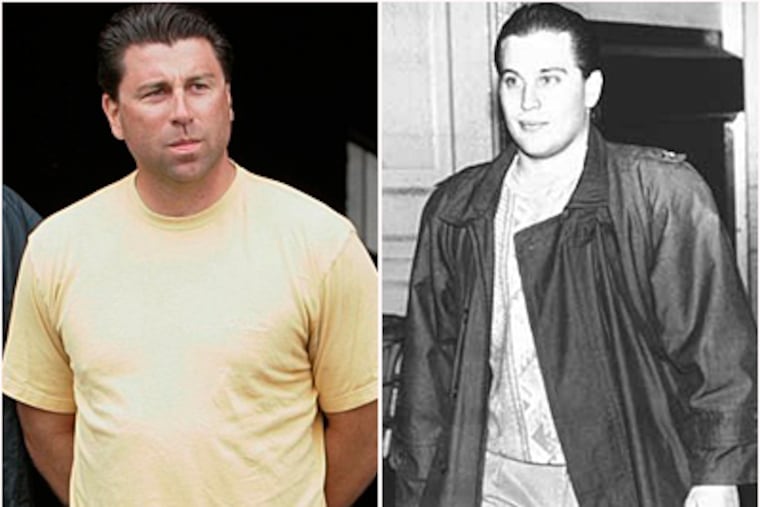Reputed mob leader facing 10 to 12 years
Reputed mob leader Andrew Merola, who took part in what a federal prosecutor called a "smorgasbord of criminal activities," faces 10 to 12 years in prison when he is sentenced Friday on a racketeering conspiracy charge.

Reputed mob leader Andrew Merola, who took part in what a federal prosecutor called a "smorgasbord of criminal activities," faces 10 to 12 years in prison when he is sentenced Friday on a racketeering conspiracy charge.
Merola, who is to appear before Judge Stanley R. Chesler in U.S. District Court in Newark, N.J., is lead defendant in the case, which targeted the New Jersey branch of the powerful Gambino crime family.
Most of his 22 codefendants have pleaded guilty.
A close friend and underworld associate of South Jersey mobster Nicky Scarfo Jr., Merola, 42, has been identified as a capo, or captain, for the Gambino organization.
Authorities charged that he headed a racketeering enterprise that engaged in fraud, extortion, labor racketeering, loan-sharking, and sports betting.
The two-year investigation, developed by the state police, the Union County Prosecutor's Office, and the FBI, involved over 39,000 wiretapped conversations that tied the defendants to a series of racketeering gambits.
"Any which way they could make money, they wouldn't hesitate to seize the moment," said former federal prosecutor Ronald Wigler, who led the case.
Wigler, who likened the crimes to a "smorgasbord," has since left the U.S. Attorney's Office.
Under terms of a plea deal entered into in December, Merola faces a sentencing-guideline range of 10 to 12 years. His attorney, Salvatore T. Alfano, is expected to argue for the low end, while prosecutors are likely to seek the maximum.
Neither would comment before Friday's hearing.
One of the more audacious schemes outlined in a 30-count indictment handed up in May 2008 involved the creation of counterfeit bar codes that Merola and his associates used to purchase high-priced items from stores like Lowe's, Home Depot, and Circuit City.
The defendants placed the phony bar codes over the bar codes of expensive merchandise before checking out, according to authorities.
They then sold the items at close to market value on the street, or peeled off the counterfeit bar codes and returned the items for full store credit.
Examples cited were a bar code for a vacuum cleaner priced at $49.97 used to buy a Dyson vacuum that listed for $549.99; a bar code from a chain saw that sold for $44.97 used to buy a saw valued at $374; and a bar code for a welding machine worth $58 used to buy a machine that sold for $669.
Authorities alleged the mobsters generated tens of thousands of dollars between February 2002 and March 2008 through various scams, including credit-card fraud and extortion.
While no exact dollar figure was placed on the schemes, as part of his plea Merola agreed to pay a $100,000 forfeiture claim.
In exchange, prosecutors agreed to lift a lien against Merola's home in East Hanover which they had alleged was purchased and improved with funds generated from the racketeering enterprise.
"He built the house with stuff he was stealing," said an investigator familiar with the case.
While Scarfo was the subject of wiretaps and surveillance during the Merola investigation, he was not named as a defendant in the case.
On the same day the indictment was announced, however, Scarfo, 44, was identified as a target in a federal probe into a multimillion-dollar financial-fraud case.
Search warrants in that investigation, which focuses on the activities of FirstPlus Financial, a Texas-based firm, were executed about the same time Merola and his codefendants were being arrested.
The cases are unrelated, but wiretaps from the North Jersey investigation include conversations about Scarfo's alleged wheeling and dealing with FirstPlus.
To date, no charges have been filed in the financial-fraud case.
Scarfo also faces racketeering and gambling charges in a separate case brought by the New Jersey Attorney General's Office this year. That case is pending in Morris County.
Scarfo and Merola became friends, according to law enforcement sources, after Scarfo relocated to North Jersey in the fall of 1989, days after he was nearly killed in a botched mob hit at Dante & Luigi's Restaurant in South Philadelphia.
Sunday will mark the 21st anniversary of that incident, considered one of the more infamous attempted hits in Philadelphia underworld history.
The shooting occurred on Halloween night as Scarfo was having dinner with two associates. While he was digging into a plate of clams and spaghetti, a man wearing a mask and carrying a trick-or-treat bag walked up to the table, pulled a gun from the bag, and opened fire.
Scarfo was hit six or seven times, but none of the bullets struck a vital organ. He was released from the hospital a few days later and shortly thereafter moved to North Jersey.
While no one has ever been charged, both law enforcement and underworld sources have identified jailed mob leader Joseph "Skinny Joey" Merlino as the shooter that night.
Investigators believe the shooting was in retaliation for the way Scarfo's father, "Little Nicky," had run the mob family before he and nearly two dozen associates, including Merlino's father, Salvatore, were jailed in 1988.